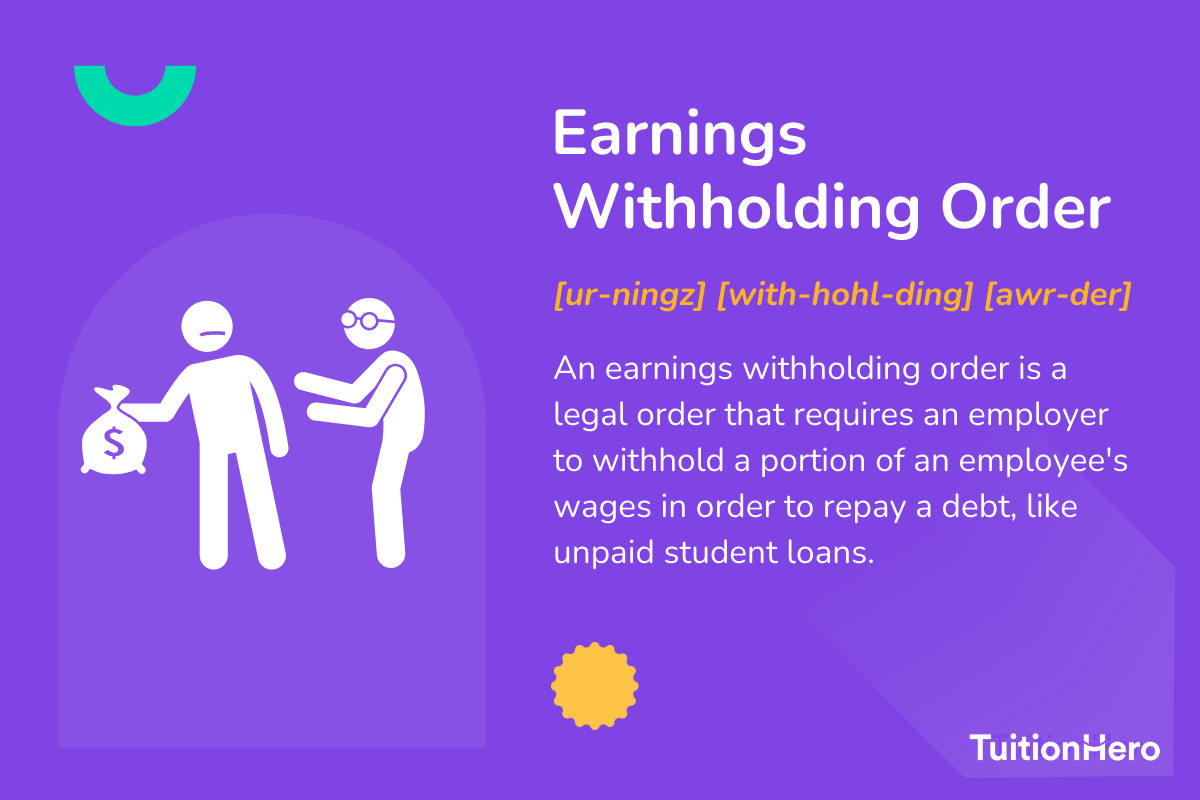Advertiser Disclosure
Last update: November 17, 2024
4 minutes read
What is an Earnings Withholding Order?
Understand earnings withholding orders, debt strategies, and financial triumphs. Your journey starts here.

By Brian Flaherty, B.A. Economics
Edited by Rachel Lauren, B.A. in Business and Political Economy
Learn more about our editorial standards



By Brian Flaherty, B.A. Economics
Edited by Rachel Lauren, B.A. in Business and Political Economy
Learn more about our editorial standards
Have you ever heard of an earnings withholding order and wondered what it is? Well, we're here to explain it in simple terms. An earnings withholding order is a court-issued command in the world of finance. It ensures fair play when it comes to settling debts between creditors and debtors. Let's break down this legal concept without getting into too much complexity.

Key takeaways
- An earnings withholding order is a court-issued directive for employers to garnish wages from an employee
- The court's involvement ensures a systematic approach to settling debts
- Detailed information in the order includes court and officer details, debtor information, creditor details, and the court case number
What is an earnings withholding order?
An earnings withholding order is a ruling from a court that tells an employer to take money from an employee's paycheck directly to pay off debts. It's a way for the court to make sure that owed money gets paid. Let's look at it a bit closer.

How does an earnings withholding order work?
Imagine this: you owe money, don’t pay it back for a while, and get sued by your creditors. They usually wait 6-12 months before taking this drastic action, and will normally try to settle and negotiate first.
Recently, I had to help a family member navigate their way through some unpaid debts. I was surprised at how willing many creditors were to negotiate alternate payment structures rather than going to court.

TuitionHero Tip
Always try to be proactive in communicating with creditors! But ultimately, if negotiations fail, a creditor may say, "Enough is enough!" and take you to court.
If the judge rules against you, they can instruct your employer, through an earnings withholding order, to take a portion of your paycheck and send it off to settle the debt. It's like payroll with a debt settlement twist.
- Courtroom drama: it all begins in court. Creditors explain their case, and if they win, there's a legal judgment.
- Passing the baton: then, the court tells your employer, "You're in charge now." They have to take a specific amount from your paycheck.
- Levying Officer: The money that's taken doesn't disappear. It goes to a levying officer, someone who handles these financial moves.
What’s inside the earnings withholding order?
Now, you might wonder what's in this magical document. Well, it contains crucial details:
- Court's ID: the court's name, address, and jurisdiction – basically, where the legal command comes from.
- Levying Officer's information: the name and address of the person handling the money – the one in charge.
- Your details: your name and address – because it's about your paycheck.
- Creditor information: the person or company you owe money to, and the court case number – so everyone knows what's going on.
- Order stamp: the date when this financial command was issued – it shows when it all started.
Compare private student loans now
TuitionHero simplifies your student loan decision, with multiple top loans side-by-side.
Compare Rates
Dos and don’ts of handling earnings withholding orders
Understanding how earnings withholding orders work is important. Let's go through what you should and shouldn't do to stay in control of your finances.
Do
Know what the order means for you.
Keep open lines with your employer and the levying officer.
If confused, don't hesitate to talk with a legal expert.
Don't
Ignore the order.
Hide from communication.
Ignore legal aid.
Advantages and disadvantages of earnings withholding orders
In the world of managing money, every action, like earnings withholding orders, has its good and not-so-good sides. Let's look closely at the details.
- Assured debt repayment: the court's involvement ensures a systematic approach to settling debts.
- Clear legal path: for creditors, it's a structured legal route to recoup what's owed.
- Financial strain on the debtor: losing a chunk of your paycheck can be tough on your budget.
- Employer-employee tensions: earnings withholding orders may strain the relationship between the employer and the affected employee, though they cannot fire you solely because of wage garnishment.
- Complexity in calculation: the rules can be complex, especially in states like California with varying criteria.

Why trust TuitionHero
At TuitionHero, we simplify college finances, even when dealing with complex matters like earnings withholding orders. Our services include private student loans, refinancing, scholarships, FAFSA help, and credit card offers. Think of us as your guide through financial challenges. Visit our website to make your college dreams financially achievable.
Frequently asked questions (FAQ)
When your earnings are held back by an order, it doesn't directly affect your credit score. However, if you’ve made it as far as an earning withholding order, it typically means that you haven’t been making your payments for a while, which has affected your credit score already. It's important to handle your money carefully to keep your credit in good shape.
You can challenge or appeal an earnings withholding order. Reasons for doing this could include wrong details, a change in your financial situation, being mistaken for someone else, or errors in the process. To make a successful appeal, follow the steps in your local laws and get legal advice.
No, earnings withholding orders are typically associated with certain types of debts, especially unsecured debts. For secured debts (like auto loans and mortgages), the legal procedures may differ. The recourse for most secured debts is to take the asset that underlies the loan (like the car or the home). It's essential to understand the nature of your debt and the applicable laws in your jurisdiction.
If a company doesn't follow a court's earnings withholding order, there can be serious legal problems. The court's instructions are legally binding, and not following them can result in penalties. Employers usually have to stick to the order and take out the specific amount mentioned from the employee's paycheck. Not only that, employers are legally prohibited from discharging or firing an employee solely because their wages are being garnished, so at least there’s some job security.
Final thoughts
Remember that being well-informed is important when managing your finances. TuitionHero is here to help you with college finances. We're not just a source of information; we're your partner, ready to support you. Face the confusion with confidence, and know that financial challenges can be overcome with the right help. If you ever need help, our team at TuitionHero is just a click away. Check out our services, and let's manage your finances together.
Source
Author

Brian Flaherty
Brian is a graduate of the University of Virginia where he earned a B.A. in Economics. After graduation, Brian spent four years working at a wealth management firm advising high-net-worth investors and institutions. During his time there, he passed the rigorous Series 65 exam and rose to a high-level strategy position.
Editor

Rachel Lauren
Rachel Lauren is the co-founder and COO of Debbie, a tech startup that offers an app to help people pay off their credit card debt for good through rewards and behavioral psychology. She was previously a venture capital investor at BDMI, as well as an equity research analyst at Credit Suisse.
At TuitionHero, we're not just passionate about our work - we take immense pride in it. Our dedicated team of writers diligently follows strict editorial standards, ensuring that every piece of content we publish is accurate, current, and highly valuable. We don't just strive for quality; we aim for excellence.
Related posts
While you're at it, here are some other college finance-related blog posts you might be interested in.
Shop and compare student financing options - 100% free!

Always free, always fast
TuitionHero is 100% free to use. Here, you can instantly view and compare multiple top lenders side-by-side.

Won’t affect credit score
Don’t worry – checking your rates with TuitionHero never impacts your credit score!

Safe and secure
We take your information's security seriously. We apply industry best practices to ensure your data is safe.
Finished scrolling? Start saving & find your private student loan rate today





